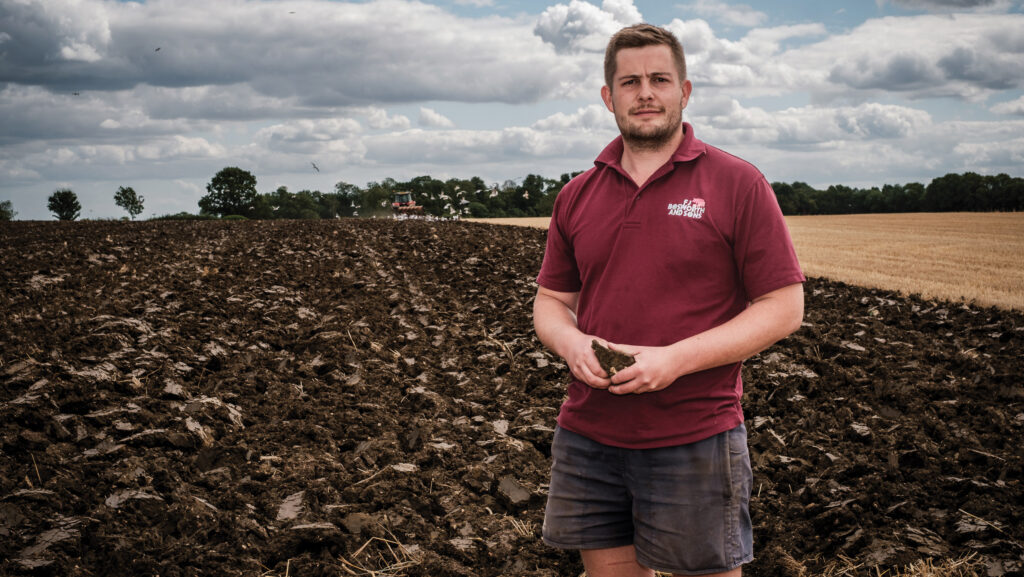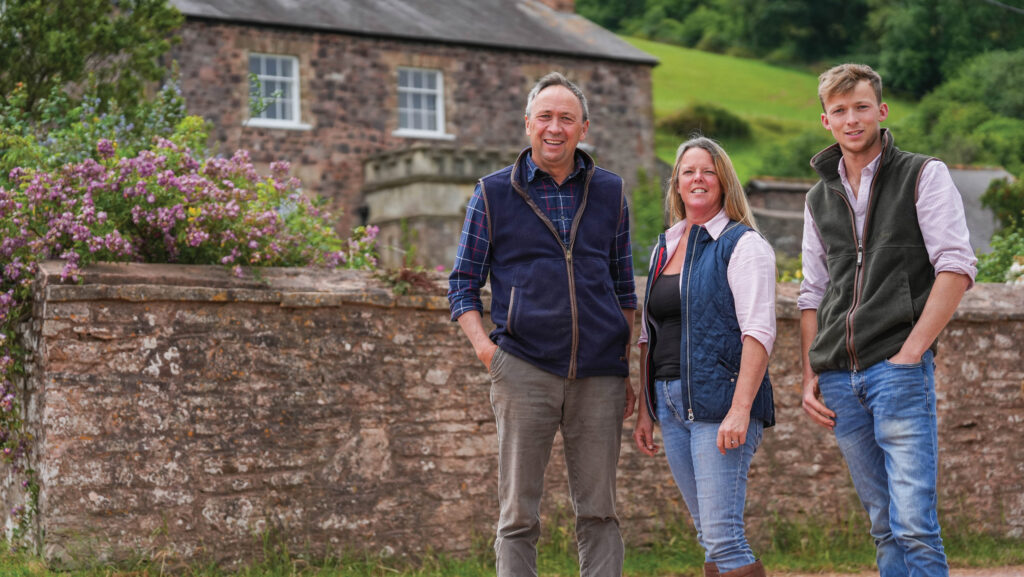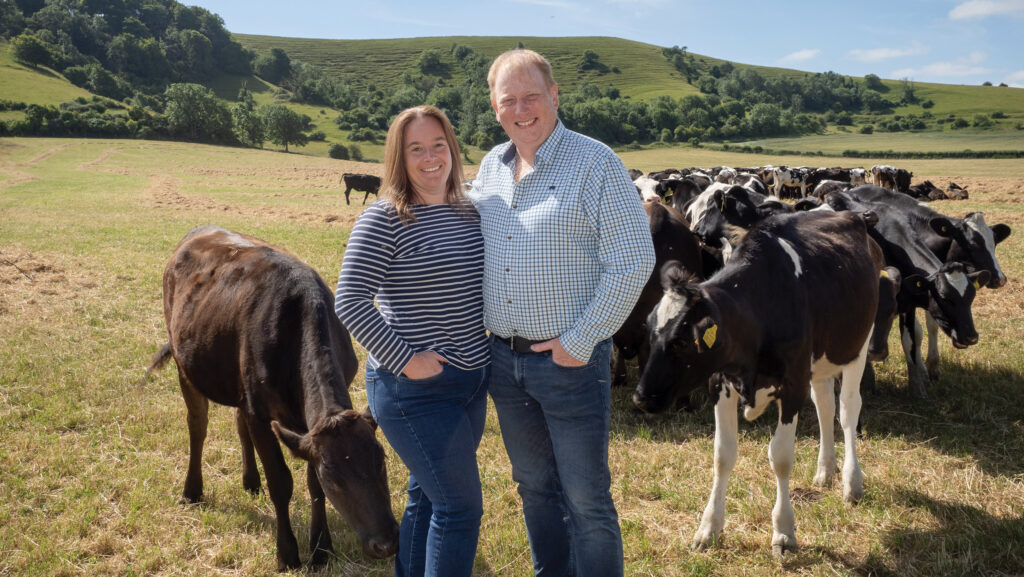Farmers Weekly Awards 2024: Mixed Farmer of the Year finalists

This year’s Mixed Farmer of the Year finalists all run contrasting enterprises, yet share a dedication to produce quality food from home-grown inputs.
The finalists
- Jack Bosworth, Spains Hall Farm, Essex
- The Speed family, Briddicott Farm, Somerset
- Nick and Lucy Tyler, Kingsplay Farming, Wiltshire
The judges
- Andrew Robinson – Senior agricultural partner for agricultural accounts Armstrong Watson LLP, based in Northumberland
- Craig and Claire Grant – Farmers Weekly’s 2023 Mixed Farmers of the Year who run 160,000 laying hens, 270 bulling heifers and 1,500 flying sheep
- Emma Gillbard – FW’s deputy arable editor specialising in soils and crop nutrition. Emma works on the family dairy farm in her spare time
See also: FW Awards: Meet the Dairy Farmer of the Year finalists
Jack Bosworth, Spains Hall Farm, Essex

Jack Bosworth © MAG/Colin Miller
Jack Bosworth returned to the family pig and arable farm back in 2017. Since taking over the business, he has doubled the pig herd to 600 sows, reduced labour costs by more than £80 a sow a year, and increased the farming area.
At just 29 years old, Jack has a clear vision of where he wants to take the business.
All 300ha of combinable cereals are fed back to the herd of 7,500 pigs. The crops are milled and mixed on both units, which creates the ability to adjust diet formulations based on crop quality, market pricing and nutritional needs.
Jack has also taken on more land in a drive to grow as much home-grown food as possible, in order to reduce reliance on purchased feed.
Value of slurry
Optimising the value of pig manure and slurry has been a game changer for the business, reducing artificial nitrogen costs by £13,000/year, and also ditching artificial P and K.
All slurry applications have been brought in-house and incorporated into the arable rotation, with the purchase of an umbilical system to optimise application timing.
Contract application has been added as a new revenue stream. Jack is now working closely with nearby farmers and has set up agreements to take on more land in return for nutrient-rich pig slurry.
“Working with neighbours has allowed us to grow more home-grown feed for our farrow-to-finish pig herd, while also improving soil health and nutrition for others,” he says.
Production efficiency
Technology, efficiency and animal welfare are all key focuses for Jack, which is why he has invested in an auto-mix system for supplementary piglet milk feed for each farrowing pen.
This, along with his fantastic staff, hygiene and attention to detail, is helping him achieve an average of 32.5 weaned pigs a sow a year.
Other investments have included automatic sow feeding, separation systems and automatic heat detection.
Jack’s costing analysis and data recording is second to none. One of his next major projects is adding value to a proportion of the pork produced on-farm.
He is set to acquire a sausage-making company to enable him to market some of his pork direct to the consumer, allowing him to reap a greater slice of the retail pound.
Arable cropping
Jack applies a stringent protocol to crop management on the arable enterprise where he grows winter wheat, oilseed rape and winter and spring barley – with good yields to show for it.
The farm’s 10-year average for winter wheat (including a trial area of continuous winter wheat now in its eighth year) is 10.22t/ha. Winter wheat and oilseed rape is 9.27t/ha and 3.9t/ha, respectively.
Jack dedicates a block of land to the Countryside Stewardship scheme incorporating AB15, AB9, AB12 and SW3. He also has a 100kW solar unit to cut back on energy requirements and manages 12ha of woodland.
Team spirit
Jack’s can-do attitude is a reflection of the positive working environment he has created for his employees. Communication is key, which is why he has regular reviews to assess how both employer and employee can improve.
He has invested in new staff facilities to create a real community feel for the people he employees.
“I treat my staff like family. Everybody’s role is of equal importance and we couldn’t do what we do without everyone.”
The numbers
- £2m Increase in annual turnover since joining the business.
- 7,500 Pigs across two pig units
- 300ha Combinable crops destined for pig feed
- 100kW Solar panels
- 4 Property lettings
- 25ha Mid-Tier Countryside Stewardship
- 31.14 Pigs sold a sow a year
- 8 Full-time staff
Farm facts
- Mixed pig and arable farm with 600 sows, with 300ha of combinable cropping
- Cropping includes winter barley, winter wheat, spring barley and oilseed rape
- Contracting side specialising in umbilical application of slurry and digestate
- Acquiring a sausage-making company to add value to pork produced
- Achieves one of the lowest pre-weaning mortalities in the country, according to the indoor pig production benchmarking
Judges liked
- Quality farrow-to-finish pig unit with excellent animal welfare
- Effective use of arable cropping with on-farm mill and mix
- Clear vision and determination to drive the business forward
- Great leadership skills and positive working environment
- Excellent handle on costings and financial analysis
What the judges say
“Jack has a clear plan for the business, his willingness to grasp the family succession plan is refreshing. The attention to detail within the pig enterprise is clear. Current diversifications are well thought through.”
The Speed family, Briddicott Farm, Somerset

Andrew, Tracey and Robert Speed © Emily Fleur
The Speed family run a truly mixed beef, sheep and arable farm on the edge of Exmoor, farming 1,000ha of tenanted land, rising from sea level to 1,200ft moorland.
Husband and wife Andrew and Tracey, together with son Robert, target each enterprise with the same level of precision, maximising output from what is mainly north-facing coastal land.
With 1,400 ewes,195 suckler cows and all feed home-produced in a four-year arable rotation, the family have successfully evolved their business since taking on their first tenancy of 24ha in 1998.
Three lambings in two years
A testament to the family’s innovative farming practices, their flock of 1,400 Friesland cross Polled Dorsets are lambed “three times in two years” – in January, September and the following May.
This drives ewe performance and balances lamb sales throughout the season.
The May and September ewes lamb outside on Italian ryegrass herbal leys before moving up the hill onto permanent pasture.
Grazing a mix of stubble turnips and clover when lambs reach 10 weeks old promotes lamb growth and flushes the ewes before the rams go in. This helps achieve a 20% higher scanning rate compared with a standard grass ley.
Grazing cereals
Autumn lambing ewes spend much of their winter grazing oilseed rape and winter wheat crops, including milling varieties.
“Our cropping and livestock enterprises all work to benefit each other,” says Andrew. “Not just the basics like the muck-for-straw, or short-term grass leys, but grazing cereals produces excellent lambs and benefits crops with reduced disease levels and higher yield potential.”
Most of the farm’s arable land is steep, challenging and small fields, but last year winter wheat averaged 9.5t/ha.
Weed management is a key focus. The family have a zero-tolerance approach to blackgrass control and all machinery work is done in-house.
Cattle are predominantly Hereford cows, with 36 native Red Devon cattle used for environmental work on the heathland. All replacements are home-bred. Cattle are fattened on home-grown grass, maize and lucerne, as well as oats and beans – hitting deadweights between 330-400kg.
Community and environment
The environment and promoting biodiversity is a real priority for the Speeds. More than 50% of the farm is in various environmental schemes, ranging from legume mixes to parkland recreation.
Nearly 300ha of land is classified as lowland heathland, of which 120ha is nestled in the ancient Dunster deer parks, where Andrew keeps 120 fallow deer, 50 red deer and 30 Exmoor ponies.
The family are working closely with Natural England to restore these areas, with large-scale environmental projects under way.
Andrew is passionate about boosting biodiversity levels, particularly native plant species such as heather and wortle berries, which are natural habitats for beneficial insects and birds.
The Exmoor ponies and 150 Exmoor Horn sheep are used to graze and manage the heathland.
“Exmoor Horns are particularly effective at controlling ragwort and help to target the weed before it flowers,” says Andrew.
Tracey and Andrew are huge advocates for UK agriculture and helping the next generation of farmers get on the agricultural ladder.
Working closely with schools and colleges, they invite primary schoolchildren on-farm and visit schools to give career advice. The couple have helped more than 20 apprentices start their farming careers.
The numbers
- 1,400 Ewes lambed three times in two years
- 195 Suckler cows with followers
- 50 Percentage of farmland in environmental schemes
- 365kg Average carcass deadweights finished on home-grown mix
- 25 Percentage of reduction in fungicide use when crops are grazed
- 200ha Land taken on a new arable contract farming agreement
Farm facts
- 1000ha mixed beef, sheep and arable farm on the edge of Exmoor, with strong focus on the environment
- Cropping 200ha winter wheat, 65ha winter barley, 52ha oilseed rape, 10ha spring oats and 18ha spring beans
- Ancient deer parks on the farm are home to 170 fallow and red deer and 30 Exmoor ponies
Judges liked
- Brilliant mix of enterprises matched strategically to the farm environment
- Strategic take on lambing blocks with three lambings every two years
- Effective integration of sheep and arable grazing
- Quality suckler cattle herd
- Real passion for promoting UK agriculture via voluntary primary school visits and college apprenticeships
What the judges say
“It is great to see the farm’s innovative ideas, including lambing sheep three times in two years to increase output and growing lucerne for forage. The family’s passion for the environment and restoring the native heathland is very inspiring.”
Nick and Lucy Tyler, Kingsplay Farming, Wiltshire

Lucy and Nick Tyler © Kathy Horniblow
Wiltshire farmers Nick and Lucy Tyler aim to “smartly integrate” their 500-cow dairy unit, Wagyu-cross beef cattle and arable enterprises, putting sustainability and marketing at the core.
The husband and wife team took the opportunity to obtain a Muller M&S milk contract, reaching the M&S Milk Pledge Plus Dairy Scheme standards and are now RSPCA assured.
Their 300-head Wagyu-cross beef cattle are marketed in-house under the farm’s own brand, Kingsplay Wagyu, which has helped to secure substantial premiums.
Some 60% of combinable crops are marketed externally, with the rest used as animal feed on the farm.
“Growing a higher proportion of our animal feed has the added bonus of our business being less exposed to volatile feed markets and allowed us to achieve concentrated feed cost below 10p/litre for the dairy,” says Lucy, who is also a fully qualified vet.
The dairy
The dairy consists of 500 Holstein-Friesian cows, producing an average 9,490 litres a cow a year, with butterfat of 4.11% and protein of 3.36%. Cows are milked twice daily and grazed from March to September.
Animal health and welfare is a top priority, which is why automatic foot-baths, an automatic system for mobility and body condition scoring are used on-farm.
The arable enterprise includes 400ha of combinable winter wheat and spring barley, 250ha of grassland and 175ha of forage crops such as maize and wholecrop spring barley/rye.
The farm achieves an average margin over purchased feed cost of 32p/litre, which includes home-grown concentrates.
“All starch in our animal rations post-weaning is home-grown, which is something we are extremely proud of,” says Nick.
The farm has started using a feed supplement, known as Bovaer, to reduce enteric methane emissions in the milking herd in a bid to cut carbon footprint.
Wagyu beef
The beef enterprise comprises 300 Wagyu-cross beef cattle which are home-bred from the dairy. Cows/heifers not served with sexed semen are served to Wagyu, and will go on to be marketed as sustainable quality beef.
Nick and Lucy moved away from British Blue semen in favour of Wagyu to improve profit margins with a niche breed and optimise calving ease. The pair have formed a close partnership with farm shops in the south of England, which enables them to achieve a 35% premium on standard beef prices.
They have also embarked on a joint venture with a Salami company to add value to lower-quality meat cuts, achieving as much as a 400% premium.
Social media platforms are used to market their produce. The pair are even running a marketing campaign #WagyuWednesday, sharing recipe videos to drive engagement.
Community
Promoting UK farming and informing schoolchildren about the world of agriculture is a real passion for Lucy, so much so the farm opened its gates for an “Open Farm Sunday Fortnight” this year.
Nick and Lucy have also launched a scheme with two local primary schools where every pupil visits the farm each year.
“These farm visits enable us to engage with children, staff and their families. We intend to roll out our scheme to an additional two to three schools by September 2025,” says Lucy.
The farm also runs a number of environmental schemes, ensuring at least 5% of the land farmed is managed as habitat for farmland birds and pollinators.
The numbers
- 500 Number of cows in dairy unit
- 300 Wagyu-cross beef cattle
- 9,490 Litres of milk a cow a year
- 32.1 Margin over purchased feed cost (pence per litre)
- 5 Percentage of farmland managed as nature habitats
- 40 Percentage of combinable crops used as animal feed
- 2 Primary schools schemes where every pupil visits the farm each year
Farm facts
- 850ha mixed dairy, beef and arable farm on the Wiltshire Downs, with focus on maximising animal welfare
- Cropping includes 400ha combinable crops, 250ha grassland and 175ha other forage
- Selling milk to Muller M&S and marketing beef cattle under own-brand label
Judges liked
- Smart integration of dairy unit, Wagyu-cross beef cattle and arable enterprises
- Strong ability to market farm produce to maximise returns
- Focus on finding niche Wagyu beef market and creating own-brand label
- Brilliant commitment and enthusiasm to educating young children on farming
- Great team environment
What the judges say
“It is clear to see the passion for their farming operations and their efficiencies in marketing. The work Lucy is doing to bring schoolchildren onto the farm and spread the farming message is brilliant and truly dedicated.”
A word from our sponsor 
“KWS is proud to acknowledge the talent in agriculture to promote sustainability, ensure the highest quality produce, and preserve the rich heritage of British farming, which is vital for our nation’s future. We wish all the finalists good luck.”
Ben Bishop, KWS UK

